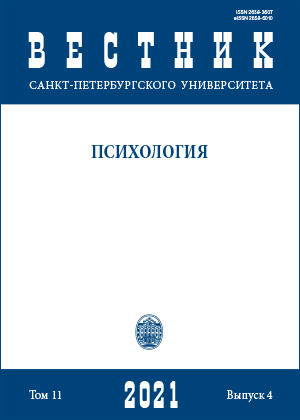Psychological analysis of the means and conditions for the formation of elementary mathematical representations in preschoolers
DOI:
https://doi.org/10.21638/spbu16.2021.407Abstract
The article aims to identify and describe the conditions as well as means of teaching that form the zone of proximal development when mastering elementary mathematical concepts (EMC) at an older preschool age (first of all, ideas about quantities: length, area, mass, volume, etc.). Also, the work analyzes the representation of these conditions and means of teaching in modern Russian preschool education programs developed on the basis of the Federal State Educational Standard for Preschool Education. The selection of programs was carried out on the basis of the PRISMA procedure, as a result of which 8 programs were selected out of 43 for analysis according to the selected criteria. Three types of the most common teaching tools were identified in situations when introducing new EMC: samples (visual or verbal instructions, rules), models (schematic representation of essential relations between objects) and symbols (symbolic representation of essential relations between objects). For the main learning conditions, the content and characteristics of those actions in which EMC data are assimilated were analyzed. It was shown that when organizing the formation of ideas about values in older preschoolers, it is psychologically more appropriate to select conditions that require the implementation of actions of selection by magnitude, indirect comparison, as well as measurement using conditional measures that is necessary in situations of representation of modeling or symbolization tools. The obtained results of the analysis of modern Russian preschool education programs indicate that most often they use only one tool — a visual sample or instruction, and the formation of ideas about the values is carried out solely on the basis of the action of direct comparison. The conducted research will make it possible to provide psychologically sound recommendations to teachers, educators and the administration of preschool educational institutions on the choice and implementation of EMC training programs.
Keywords:
preschool education, elementary mathematical representations, teaching tools, sample, model, symbol
Downloads
References
References
Paramonova, L.A. (2018). Origins: A comprehensive educational program of preschool education. 6th ed. rew. Moscow, TTs Sfera Publ. (In Russian)
Downloads
Published
How to Cite
Issue
Section
License
Articles of "Vestnik of Saint Petersburg University. Psychology" are open access distributed under the terms of the License Agreement with Saint Petersburg State University, which permits to the authors unrestricted distribution and self-archiving free of charge.




